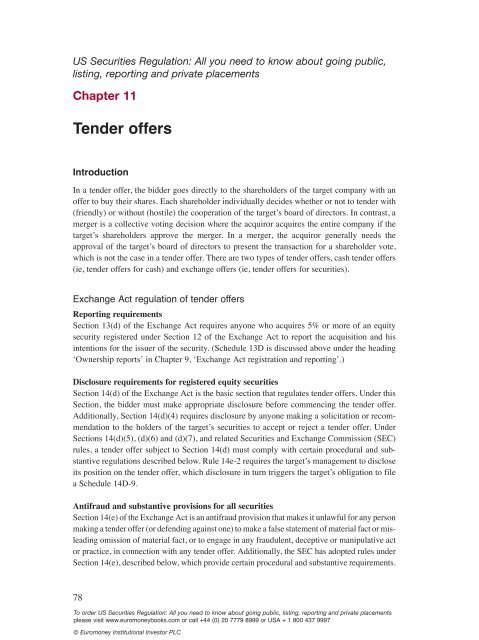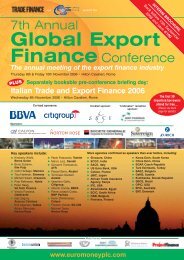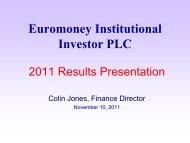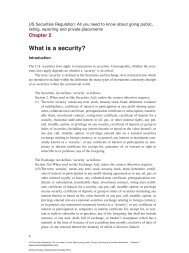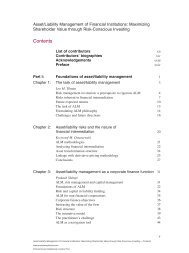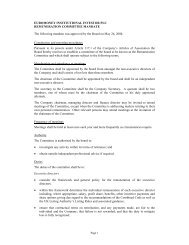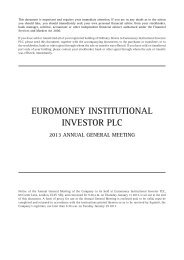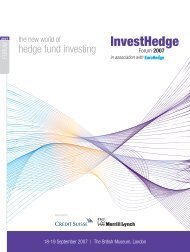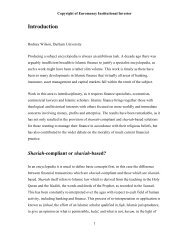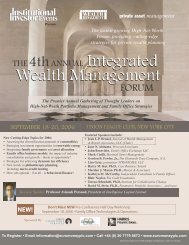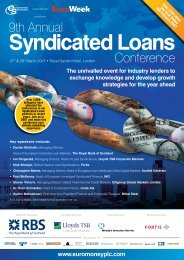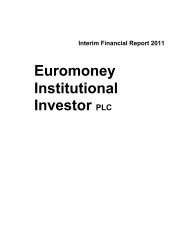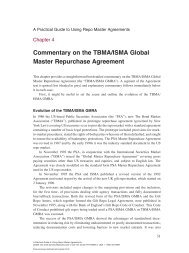US Securities sample - Euromoney Institutional Investor PLC
US Securities sample - Euromoney Institutional Investor PLC
US Securities sample - Euromoney Institutional Investor PLC
- No tags were found...
Create successful ePaper yourself
Turn your PDF publications into a flip-book with our unique Google optimized e-Paper software.
<strong>US</strong> <strong>Securities</strong> Regulation: All you need to know about going public,listing, reporting and private placementsChapter 11Tender offersIntroductionIn a tender offer, the bidder goes directly to the shareholders of the target company with anoffer to buy their shares. Each shareholder individually decides whether or not to tender with(friendly) or without (hostile) the cooperation of the target’s board of directors. In contrast, amerger is a collective voting decision where the acquiror acquires the entire company if thetarget’s shareholders approve the merger. In a merger, the acquiror generally needs theapproval of the target’s board of directors to present the transaction for a shareholder vote,which is not the case in a tender offer. There are two types of tender offers, cash tender offers(ie, tender offers for cash) and exchange offers (ie, tender offers for securities).Exchange Act regulation of tender offersReporting requirementsSection 13(d) of the Exchange Act requires anyone who acquires 5% or more of an equitysecurity registered under Section 12 of the Exchange Act to report the acquisition and hisintentions for the issuer of the security. (Schedule 13D is discussed above under the heading‘Ownership reports’ in Chapter 9, ‘Exchange Act registration and reporting’.)Disclosure requirements for registered equity securitiesSection 14(d) of the Exchange Act is the basic section that regulates tender offers. Under thisSection, the bidder must make appropriate disclosure before commencing the tender offer.Additionally, Section 14(d)(4) requires disclosure by anyone making a solicitation or recommendationto the holders of the target’s securities to accept or reject a tender offer. UnderSections 14(d)(5), (d)(6) and (d)(7), and related <strong>Securities</strong> and Exchange Commission (SEC)rules, a tender offer subject to Section 14(d) must comply with certain procedural and substantiveregulations described below. Rule 14e-2 requires the target’s management to discloseits position on the tender offer, which disclosure in turn triggers the target’s obligation to filea Schedule 14D-9.Antifraud and substantive provisions for all securitiesSection 14(e) of the Exchange Act is an antifraud provision that makes it unlawful for any personmaking a tender offer (or defending against one) to make a false statement of material fact or misleadingomission of material fact, or to engage in any fraudulent, deceptive or manipulative actor practice, in connection with any tender offer. Additionally, the SEC has adopted rules underSection 14(e), described below, which provide certain procedural and substantive requirements.78To order <strong>US</strong> <strong>Securities</strong> Regulation: All you need to know about going public, listing, reporting and private placementsplease visit www.euromoneybooks.com or call +44 (0) 20 7779 8999 or <strong>US</strong>A + 1 800 437 9997© <strong>Euromoney</strong> <strong>Institutional</strong> <strong>Investor</strong> <strong>PLC</strong>
TENDER OFFERSWhat is a tender offer?A ‘tender offer’ is generally thought to be an offer to purchase that is made ‘publicly’, to allor substantially all of the shareholders of a corporation. However, it is not defined in theExchange Act. The courts define the term ‘tender offer’ on a case-by-case basis, and a broaddefinition is used so as to effectuate the purposes of the Exchange Act and its tender offer provisions(ie, protection of the public and of investors). Consequently, all of the relevant factsmust be considered in determining whether a tender offer exists.Eight-factor testMost courts refer to the eight-factor test given in Wellman v. Dickinson, 475 F. Supp 783(S.D.N.Y 1979). However, not all eight factors need be present for the court to find a tenderoffer. The eight factors are listed below.a) Was there an active and widespread solicitation of shares by the offeror?b) Was the solicitation for a substantial percentage of the outstanding stock?c) Was a premium price offered over the market price before the offer?d) Were the terms of the offer firm and fixed?e) Was the offer contingent on the tender by shareholders of a fixed minimum number ofshares?f) Was the offer by shareholders open for only a limited time?g) Was there pressure put on shareholders to sell?h) Were there public announcements accompanying the offer?Hanson Trust ‘totality of the circumstances’ testIn the Hanson Trust case, 774 F.2d 47 (2d Cir. 1985), the Second Circuit declined to elevateWellman to a ‘litmus test’, and stated that the question:whether a solicitation constitutes a ‘tender offer’ within the meaning of Section 14(d)turns on whether, viewing the transaction in the light of the totality of the circumstances,there appears to be a likelihood that unless the pre-acquisition filing stricturesof Section 14(d) are followed there will be a substantial risk that solicitees willlack information needed to make a carefully considered appraisal of the proposal putbefore them.Acquisitions over a stock exchangeNormally, acquisitions made over a stock exchange in normal market transactions would notbe a tender offer. However, under appropriate circumstances (for example, if the eight-factortest of Wellman were met), open-market purchases could amount to a tender offer.Negotiated purchasesSimilarly, although privately negotiated purchases ordinarily do not constitute tender offers,under appropriate circumstances (for example, when enough of the Wellman factors are pre-To order <strong>US</strong> <strong>Securities</strong> Regulation: All you need to know about going public, listing, reporting and private placementsplease visit www.euromoneybooks.com or call +44 (0) 20 7779 8999 or <strong>US</strong>A + 1 800 437 9997© <strong>Euromoney</strong> <strong>Institutional</strong> <strong>Investor</strong> <strong>PLC</strong>79
U.S. SECURITIES REGULATIONsent, or when the ‘totality of the circumstances’ so dictates) negotiated purchases may amountto a tender offer.Alternative test for open-market and negotiated purchasesStill another test, broader than the eight-factor test of Wellman, supra, and designed to applyto open-market and negotiated purchases, was applied by the court in S-G <strong>Securities</strong>, Inc. v.Fuqua Investment Co, 466 F. Supp. 1114 (D. Mass. 1978). Under the S-G <strong>Securities</strong> test, atender offer is present if there is:• a publicly announced intention by the bidder to acquire a block of the target’s stock, forthe purpose of acquiring control of the target; and• a subsequent rapid acquisition by the bidder of large blocks of stock through open-marketand privately negotiated purchases.Tender offers rules for registered equity securities: Section 14(d)Application of section 14(d) of the Exchange ActSection 14(d) of the Exchange Act and its related rules apply to tender offers for anyclass of equity securities registered under Section 12 of the Exchange Act that, if successful,would result in the bidder beneficially owning more than 5% of the class of securitiestendered.If Section 14(d) applies, Regulation 14D requires the following.Pre-commencement communicationsCommunications concerning a contemplated tender offer may be distributed before commencementof a tender offer. However, generally, the communication must be filed with theSEC on the date of first use.When a tender offer commencesA tender offer commences when the bidder first publishes, sends or gives to security holdersof the target the means of tender, ie, the transmittal form or a statement how it may beobtained. This is true even if there is no current offer by the bidder to purchase securities.Disclosure of informationThe bidder must make the following disclosures in connection with the tender offer:Schedule TO. A bidder must file Schedule TO with the SEC (with copies delivered to thetarget, competing bidders and all stock exchanges on which a target’s stock is traded) whenthe tender offer commences.The disclosures required by Schedule TO include:a) a plain English summary term sheet;b) target company identifying information;c) identity and background of the bidder;d) terms of the transaction;80To order <strong>US</strong> <strong>Securities</strong> Regulation: All you need to know about going public, listing, reporting and private placementsplease visit www.euromoneybooks.com or call +44 (0) 20 7779 8999 or <strong>US</strong>A + 1 800 437 9997© <strong>Euromoney</strong> <strong>Institutional</strong> <strong>Investor</strong> <strong>PLC</strong>
TENDER OFFERSe) past contacts, transactions or negotiations with the target;f) purposes of the transactions;g) source and amount of funds;h) persons retained, employed, or to be compensated in connection with the offer;i) if material to a decision by a potential tendering shareholder, financial statements of thebidder; andj) if material to a decision by a potential tendering shareholder, certain additional informationabout: the relationships between the bidder, the target, and their respectiveofficers and directors; regulatory and antitrust issues affecting the transaction; applicabilityof the margin regulations (governing the use of securities as collateral forloans); pending litigation affecting the offer; and other information material to the tenderingshareholders.Disclosure and publication of tender offer documents. In addition to filing the ScheduleTO, the bidder must (both as a practical and a legal matter) take steps to inform the publicof the offer. In addition to satisfying a disclosure requirement, the offer is generallydeemed to commence on the date the means to tender are first published, sent or given toshareholders. Typically, this will happen in one of two ways: long-form publication orsummary publication.• Long-form publication. Long-form publication essentially requires the bidder to publishthe offer (which must include or summarize the Schedule TO) in a newspaper of generalcirculation. Because this produces a rather lengthy (and expensive) advertisement, it israrely used.• Summary publication. Summary publication consists of a short advertisement, similar to a‘tombstone’ advertisement that gives the essential terms of the offer and states wherecopies of the complete offer materials may be obtained.Target’s recommendation. Regulation 14D also regulates the disclosure required in thetarget’s recommendation and its dissemination to shareholders.Substantive requirementsIn addition to requiring disclosure, Section 14(d) also imposes the following substantiverequirements on tender offers. They are intended to ensure minimum standards of fairness andto curb abuses.a) Withdrawal right. The offeree may change his mind and withdraw the securities that hetendered and deposited with the offeror at any time while the offer remains open.b) Prorationing in a partial tender offer. Where the bidder seeks to purchase less than all ofthe issuer’s outstanding stock and a greater number of shares are offered than the bidderintends to purchase, it must purchase shares pro rata from each person who tenders.c) Opening the offer equally to all security holders: the ‘all holders’ requirement. A tenderoffer must be open to all holders of the securities for which the offer is made.d) Equal treatment of all security holders in the price paid for their securities: the ‘best price’requirement. The consideration paid to any security holder in the offer must be the highestconsideration paid to any other holder during the offer.To order <strong>US</strong> <strong>Securities</strong> Regulation: All you need to know about going public, listing, reporting and private placementsplease visit www.euromoneybooks.com or call +44 (0) 20 7779 8999 or <strong>US</strong>A + 1 800 437 9997© <strong>Euromoney</strong> <strong>Institutional</strong> <strong>Investor</strong> <strong>PLC</strong>81
U.S. SECURITIES REGULATIONe) Limited subsequent offering period. After the initial offering period has expired and after thesuccessful completion of a tender offer, a third-party bidder may provide a subsequent offeringperiod during which securityholders can tender their securities into the offer withoutwithdrawal rights. This subsequent offering period may last from three to 20 business days.Offers requiring registration under the <strong>Securities</strong> ActWhere a tender offer involves the public offer of the bidder’s securities to the target’sshareholders, the bidder must also register the subject securities under the <strong>Securities</strong> Act(unless an exemption applies). In that case, the bidder must file both Schedule TO and theappropriate <strong>Securities</strong> Act registration form with the SEC, and must distribute both thetender offer documents and the prospectus for the securities offered to the shareholders ofthe target.Exemptions to section 14(d) of the Exchange ActThe tender offer rules of Section 14(d) do not apply in the situations described below.5% limitationSection 14(d)(1) is not applicable if, after consummation of the offer, the person making theoffer is not the owner of at least 5% or more of the class of equity security tendered.Equity securitiesOnly equity securities registered under Section 12 of the Exchange Act are covered bySection 14(d)(1), ie, registered common stock, as opposed to debt securities, or bonds.Offers made by the issuer for its own securitiesOffers made by the issuer for its own securities are not covered by Section 14(d) but are coveredby the issuer self-tender rules of Section 13e-4 of the Exchange Act.Tender offer rules for all securities: Section 14(e)Section 14(e) of the Exchange Act and its related rules apply to tender offers for any securityregardless of whether it is an equity security or registered under Section 12 of the ExchangeAct. Section 14(e) of the Exchange Act is a broadly-worded, antifraud provision that prohibitsany person from making material false statements or misleading omissions, and from engagingin any fraudulent, deceptive or manipulative acts or practices, in connection with a tenderoffer or a solicitation of securityholders in opposition to or in favor of a tender offer.If Section 14(e) applies, Regulation 14E requires the following conditions to be met.DurationThe bidder must keep its offer open for at least 20 business days from the date the tenderoffer commences. The offer must also remain open for at least 10 business days from thedate that notice is first published, sent or given to securityholders of any change in the percentageof the class of securities being sought, in the consideration offered, or in thedealer’s soliciting fee. The minimum time period an offer must remain open followingmaterial changes in the terms of the offer or in information concerning the offer (other than82To order <strong>US</strong> <strong>Securities</strong> Regulation: All you need to know about going public, listing, reporting and private placementsplease visit www.euromoneybooks.com or call +44 (0) 20 7779 8999 or <strong>US</strong>A + 1 800 437 9997© <strong>Euromoney</strong> <strong>Institutional</strong> <strong>Investor</strong> <strong>PLC</strong>
TENDER OFFERSa change in the percentage of the class of securities being sought, in the considerationoffered or in the dealer’s soliciting fee) will depend on the facts and circumstances. Theseinclude the relative materiality of the terms of information and the nature of the disseminationrequired.Prompt payment or return of tendered securitiesThe bidder must pay the consideration offered or return the securities deposited by securityholderspromptly after the termination of the tender offer, which generally means no later thanthe third business day after the date of the transaction.Target company recommendationsWithin 10 business days from the date the bidder’s tender offer commences, the target companymust publish, send or give to securityholders a statement of its position, disclosing whether it:a) recommends accepting or rejecting the bidder’s tender offer;b) expresses no opinion and is remaining neutral; orc) is unable to take a position concerning the bidder’s tender offer. The statement must alsoinclude the reasons for the target’s position (including its inability to take a position).Insider-trading prohibited: disclose or abstain from tradingAny person who possesses material information concerning a tender or proposed tender offerby another person is prohibited from trading in target securities (or any related securities orrelated options) if:• the bidder has commenced or taken a substantial step to commence a tender offer; and• the person who possesses the information knows or has reason to know that the informationis non-public and was acquired from the bidder, the target, or any person acting ontheir behalf, unless the information and its source are publicly disclosed within a reasonabletime before the trade.This prohibition does not apply to (a) purchases by a broker or another agent on behalf of thebidder and (b) sales by any person to the bidder.No purchases outside the offerThe bidder is prohibited from purchasing any securities of the class tendered and any relatedsecurities outside the tender offer. This provision is intended to prevent the bidder frommanipulating the market price during the offer or from giving a person selling outside theoffer a different deal than that received by persons tendering shares into the offer.No false announcementsA bidder is prohibited from publicly announcing plans to make a tender offer:a) without an intent to commence the offer within a reasonable time and complete the offer;b) with the intent to manipulate the price of the bidder’s or target’s securities; orc) without a reasonable belief that the bidder will have the means to purchase the securitiessought in the offer.To order <strong>US</strong> <strong>Securities</strong> Regulation: All you need to know about going public, listing, reporting and private placementsplease visit www.euromoneybooks.com or call +44 (0) 20 7779 8999 or <strong>US</strong>A + 1 800 437 9997© <strong>Euromoney</strong> <strong>Institutional</strong> <strong>Investor</strong> <strong>PLC</strong>83
U.S. SECURITIES REGULATIONCross-border tender offer for a foreign target – Tier I and Tier IIThe exemptions for cross-border tender and exchange offers for the securities of foreign privateissuers are designated Tier I and Tier II. Neither of the exemptions relieves issuers,third-party bidders or other persons from the antifraud or anti-manipulation rules or the civilliability provisions of the U.S. securities laws.Tier IThe Tier I exemption provides a complete exemption from U.S. tender offers (both issuer andthird-party) and going-private regulation so long as:a) U.S. holders own 10% or less of the class of securities sought in the tender offer;b) U.S. holders participate in the offer on terms at least as favorable as those offered to anyother holders subject to several exceptions, described below;c) bidders provide security holders with the tender offer circular or other offering document,in English, on a comparable basis to that provided to other security holders; andd) bidders that would otherwise have to file a tender offer statement (Schedule TO) with theSEC must submit (rather than file) an English language translation of the offering materialsto the SEC under cover of Form CB and, in the case of a foreign offeror, file a consentto service on Form F-X. Also, the target company may, in lieu of filing its response underSchedule 14-D9, submit its home jurisdiction response materials under cover of Form CB.The nationality of the bidder does not matter. U.S. bidders may rely on the exemption. Thetarget must be a foreign private issuer and not an investment company (other than a registeredclosed-end investment company).The equal-treatment requirement [paragraph b) above] mandates not only equal type andamount of consideration, but also equality in procedural terms of the tender offer (such asduration, pro-rationing and withdrawal rights).Exceptions to the equal treatment requirementCash-only exception. U.S. holders may be offered only cash if the bidder has a reasonable basisto believe that the cash is substantially equivalent to the value of the securities and any cash orother consideration offered to non-U.S. holders. To ensure equivalent value, if the offered securityis not a ‘margin security’ under Regulation T, the offeror must provide (upon the requestof the SEC or a U.S. security holder) an opinion from an independent expert stating that thecash-only consideration is substantially equivalent to the securities and any cash offered outsidethe United States. If the offered security is a margin security, no opinion is needed.Blue sky exception. In an exchange offer, the offeror may also exclude U.S. holders in anystate that:(i) does not have an applicable blue sky exemption (for an offer exempt from <strong>Securities</strong> Actregistration under Rule 802 discussed below); or(ii) does not register or qualify the offer after a good faith effort by the offeror to do so (foran offer registered under the <strong>Securities</strong> Act).84To order <strong>US</strong> <strong>Securities</strong> Regulation: All you need to know about going public, listing, reporting and private placementsplease visit www.euromoneybooks.com or call +44 (0) 20 7779 8999 or <strong>US</strong>A + 1 800 437 9997© <strong>Euromoney</strong> <strong>Institutional</strong> <strong>Investor</strong> <strong>PLC</strong>
TENDER OFFERSHowever, in both cases the offeror must offer those security holders cash considerationinstead of excluding them, if it has offered cash consideration to security holders in anotherstate or in a jurisdiction outside the United States.Tier IIThe Tier II exemption provides relief from selected provisions of the tender offer rules forissuer and third-party tender offers when:• the subject company is a foreign private issuer (and not an investment company, other thana registered closed-end investment company); and• U.S. security holders own no more than 40% of the class of securities sought in thetender offer.As with Tier I, the bidder’s nationality does not matter. The exemptions address a number ofprovisions that frequently conflict with home jurisdiction regulations (principally the U.K.Takeover Code), and from which the SEC staff has from time-to-time granted relief on a caseby-casebasis. The exemptions include:a) equal treatment of target security holders (the ‘all holders’ and ‘best price’ requirements);b) notice of extensions of the offer;c) prompt payment for or return of tendered securities;d) subsequent offering period withdrawal rights; ande) extension of the offer after reduction or waiver of minimum tender condition.The Tier II bidder must comply with the remaining tender offer provisions, including the procedural,disclosure and filing requirements. U.S. tender offer documents (for example,Schedule TO), rather than Form CB, must be used in a Tier II tender offer. Additionally, TierII transactions are not exempt from the ‘going private’ provisions of Rule 13e-3 under theExchange Act.Rule 802Rule 802 provides an exemption for offerings of securities in exchange for the securities offoreign private issuers in an exchange offer or business combination. The exemptions do notrelieve issuers, third-party bidders or other persons from the anti-fraud or anti-manipulationrules or the civil liability provisions of the securities laws.Rule 802 provides an exemption from <strong>Securities</strong> Act registration for offers and sales inany exchange offer for a class of securities of a foreign private issuer, or in any exchange ofsecurities for the securities of a foreign private issuer in any business combination, if the U.S.holders of the foreign subject company hold no more than 10% of the securities that are thesubject of the exchange offer or business combination.For the exemption to apply, U.S. holders must participate in the exchange offer or businesscombination on terms at least as favorable as the other holders of the subject securities (subjectto an exception comparable to the Tier I blue sky exception). The exemption is not con-To order <strong>US</strong> <strong>Securities</strong> Regulation: All you need to know about going public, listing, reporting and private placementsplease visit www.euromoneybooks.com or call +44 (0) 20 7779 8999 or <strong>US</strong>A + 1 800 437 9997© <strong>Euromoney</strong> <strong>Institutional</strong> <strong>Investor</strong> <strong>PLC</strong>85
U.S. SECURITIES REGULATIONditioned on delivery of any specific form of disclosure documents, but any information disseminatedto holders of the subject securities or published in the home jurisdiction must besimilarly disseminated or published in English for U.S. holders. This information must alsobe submitted in English on Form CB to the SEC along with, in the case of a foreign offeror,a Form F-X consent to service.The Rule 802 exemption covers only the issues of the securities and the transactions inwhich the securities are exchanged. It does not provide an exemption to affiliates or othersfor resales of the issuer’s securities. <strong>Securities</strong> acquired in a Rule 802 transaction arerestricted securities if the securities for which they were exchanged were restricted securitiesin the hands of the holders. Conversely, the securities are unrestricted (and thus freely tradable),if the securities for which they were exchanged were unrestricted, except by affiliatesof the issuer in whose hands they will constitute control stock.Blue sky complianceThere is no general exemption from state blue sky laws that parallels Rules 800-802.Therefore, issuers must ensure that they consider the effect of blue sky laws before relying onthese rules. However, to the extent that the offered securities are listed on a national stockexchange (for example, the New York Stock Exchange) or quoted on the Nasdaq NationalMarket, federal regulation has preempted state registration requirements.The MJDS and tender offersRequirementsFor tender offers for Canadian targets, the Multijurisdictional Disclosure System (MJDS) providesrelief from the U.S. tender offer rules. The target must be a Canadian foreign privateissuer, with less than 40% of its stock held in the U.S. The bidder is entitled to rely on a conclusivepresumption that the issuer is a foreign private issuer and that U.S. holders hold lessthan 40% of the subject class of securities unless:i) the bidder has actual knowledge to the contrary;ii) the issuer’s most recent annual report or AIF indicates that U.S. holders hold more than40%; oriii)the aggregate trading volume on Nasdaq and all U.S. exchanges exceeds that of allCanadian exchanges and the CDN over the 12 months preceding the tender offer.The offer must comply with Canadian tender offer rules, and the issuer must not obtain anyregulatory relief from Canadian requirements that provide protections similar to those providedby the U.S. tender offer rules. Bidders of any nationality may rely on MJDS for cashtender offers. However, only Canadian issuers may use MJDS for exchange offers.Share ownershipHostile bidders may rely on a presumption that a target satisfies the non-ownership test if:• the target’s U.S. or Canadian public filings do not disclose otherwise; and86To order <strong>US</strong> <strong>Securities</strong> Regulation: All you need to know about going public, listing, reporting and private placementsplease visit www.euromoneybooks.com or call +44 (0) 20 7779 8999 or <strong>US</strong>A + 1 800 437 9997© <strong>Euromoney</strong> <strong>Institutional</strong> <strong>Investor</strong> <strong>PLC</strong>
TENDER OFFERS• reported trading volume from all U.S. markets does not exceed reported trading volume inall Canadian markets, unless the bidder has actual knowledge to the contrary.Once an offer is commenced under the MJDS, competing bidders may also use the MJDS.This is so even if the target’s U.S. ownership goes over 40%, as sometimes happens whenU.S. arbitrageurs become involved, or if the original bid was made under the MJDS inreliance on the presumption based on trading volume and actual U.S. ownership turned out tobe greater than 40%.SEC filingTender offer materials are prepared under Canadian requirements and, if the target’s securitiesare registered under the Exchange Act, are filed with the SEC under cover of Schedule14D-1F. The target company’s response is filed under Schedule 14D-9F.Exchange offersWhere securities are offered, qualifying Canadian bidders may file MJDS <strong>Securities</strong> Actregistration statements on Forms F-8 or F-80 (the MJDS exchange offer forms), or FormF-10 (the general, all-purpose MJDS form). The Registration Statement is effective uponfiling and there is no SEC review, other than to check the bidder’s eligibility to use theselected form.Blue sky complianceWhere securities are offered, MJDS transactions must comply with the state blue sky laws.The states have not adopted blanket exemptions for MJDS exchange offers. Where theissuer’s securities are listed on a U.S. national stock exchange or the Nasdaq National Market,blanket exemptions are available. However, for other transactions, the securities must be registeredor exempt in any state where holders of the target’s securities reside. Most states haveexemptions for transactions effected by shareholder vote, but not for exchange offers. Stateexemptions are not uniform, and must be reviewed on a state-by-state basis.A 50-state blue sky filing can be costly and administratively burdensome. Additionally,the filings are not automatically effective, and the states reserve the right to review thembefore declaring them effective so the offer can be consummated. Many states have adoptedprocedures for expedited seven-day review of Form F-8 registration statements. Normally,states have not raised significant comments or caused delays, but the issuer can never be surein advance that a state will not have significant comments or cause delay through slow processingof the filing. Accordingly, particularly in smaller deals, issuers seek to minimize thenumber of states in which they must file by seeking out exemptions.Going private transactionsUnlike the Tier I exemption, the MJDS does not provide an exemption from the ‘going private’provisions of Rule 13e-3 under the Exchange Act.To order <strong>US</strong> <strong>Securities</strong> Regulation: All you need to know about going public, listing, reporting and private placementsplease visit www.euromoneybooks.com or call +44 (0) 20 7779 8999 or <strong>US</strong>A + 1 800 437 9997© <strong>Euromoney</strong> <strong>Institutional</strong> <strong>Investor</strong> <strong>PLC</strong>87
U.S. SECURITIES REGULATION‘Stop at the border’ offeringsForeign private issuers making share exchange offers have frequently used a techniquesometimes referred to as ‘stop at the border’ or ‘vendor placement’ to avoid <strong>Securities</strong> Actregistration. <strong>Securities</strong> that would otherwise be delivered to U.S. holders are instead deliveredto a trustee and sold in the issuer’s home market. The trustee pays the net proceeds ofthe sale to the U.S. holders.‘Stop at the border’ transactions still must comply with or obtain exemption from U.S.tender offer rules if the target’s securities are registered under the Exchange Act. For a longtime, the SEC staff would issue no action letters for these transactions only if the issuer guaranteedthat U.S. holders would receive a specified minimum payment per share. (The noaction letters confirmed that <strong>Securities</strong> Act registration was not required and provided relieffrom the equal treatment requirements of the tender offer rules applicable to Exchange Actregistered securities.) Recently, the staff has granted no action relief without the guaranteedminimum payment.While deliberating on the scope of the cross-border exemptions to be included in thecross-border rules, the SEC considered and rejected the possibility of granting blanket relieffor ‘stop at the border’ transactions in a rule, but stated that no action relief would continueto be available on a case by case basis.Complying with U.S. domestic tender offer rulesWhere neither the MJDS nor the exemption for cross-border tender offers provide relief,tender offers for a class of securities registered under the Exchange Act must comply with thefiling, disclosure and procedural requirements of the SEC’s tender offer rules.Where the bidder will issue securities and neither the MJDS nor any exemption from registrationis available, the bidder must register the securities under the <strong>Securities</strong> Act, normallyusing Form F-4.Form F-4 registration statements filed in tender offers and business combinations aresubject to SEC review, and the offer or combinations may not be consummated until theSEC’s review and comment process is completed.In the absence of a listing of the bidder’s shares on a U.S. exchange or the NasdaqNational Market, or some other exemption, registration under state blue sky laws is alsorequired. State regulators may feel freer to comment on Form F-4 filings than on MJDS filing,raising the possibility of a more burdensome and lengthy state review process.To order this book please click here:http://www.euromoneyplc.com/default.asp?page=4&productID=2921&VS=6188


